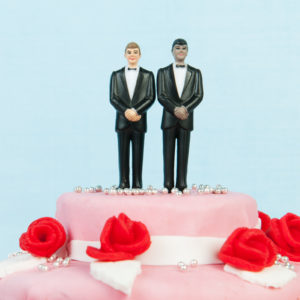The mantle of religious freedom has been grossly distorted when we Christians are using it to deny a couple entering the covenant of marriage their dream wedding cake.
Yet that is exactly what’s happening in a case that’s now going before the Supreme Court, in which Colorado’s Masterpiece Cakeshop is fighting for its right to refuse service for same-sex weddings.
As a priest in the Episcopal Church, I’m passionate about religious freedom as a core American value that should be cherished and protected. Yet I am troubled that the Alliance Defending Freedom, an organization located in Scottsdale, Arizona, less than 30 miles from where I preach on Sundays, is using the claim of religious freedom to justify discrimination in the Masterpiece Cakeshop case.
ADF filed the appeal on behalf of the baker and has supported discriminatory “bathroom bills” and the ridiculous notion of a “homosexual agenda” that is dedicated to destroying Christianity. Such hostile actions led the Southern Poverty Law Center to declare ADF a hate group.
I have noticed an unprecedented rise in attacks to LGBTQ equality “in the name of God.” For example, Great Hearts Academies, one of the largest charter school systems in Arizona, requires students to use the bathrooms and locker rooms matching the sex on their birth certificates. They’ve even extended the rule to the use of pronouns and the dress code. This is blatant and targeted discrimination against transgender students, and flies directly in the face of our baptismal call as Christians to “respect the dignity of every human being.”
In all honesty, I haven’t always understood what it means to be transgender. Through my ministry at Trinity Episcopal Cathedral, I have come to know many gay and transgender people and their families. I came to see that by focusing on one aspect of a person, I had missed the whole of who God created them to be, and my eyes needed to see a broader perspective of the abundant beauty of life in the Kingdom of God.
As a follower of Jesus first and foremost, I was taught to follow the Golden Rule, a principle strongly derived from Jesus’s commandments to love God with all our heart, mind and strength, and to love our neighbors as ourselves. The Golden Rule is a simple concept, yet its practice gets lost among the divisiveness and vitriol of discrimination in our society. The most important value the Christian faith requires is that we love everyone, just as Jesus loves everyone.
If on Sundays I preach that we’re all the beloved children of God, and then I go and shame my brothers and sisters and condemn whom they love or how they express their gender identity, I am a hypocrite. St. Paul even emphatically proclaims, “There is therefore now no condemnation for those who are in Christ Jesus.” (Romans 8:1) The practice of denying equality, in ways hate groups like ADF promote and practice, ignores the heart of what the Bible says – to love your neighbor as yourself – and such practices are antithetical to Christianity. I believe professing and practicing faith freely is important, but not at the expense of the freedom and equal treatment of others.
I have seen some media sources label hate groups like ADF simply as conservative or Christian, withholding crucial organizational context and history, conflating Christianity with religious extremism. This rhetoric fuels false divides between the expression of faith and equality.
Groups like Eliminate Hate, a nationwide coalition of organizations, faith leaders and local communities, are taking action to expose, undermine and mitigate the increasing influence and harmful impact of anti-LGBTQ hate groups. I’m encouraged by their efforts to empower local leaders and support community members confronting extremism in their daily lives.
I encourage people of all faiths to stand up against discrimination of any kind, especially in places like Arizona or North Carolina or Texas, where bathroom bills have made it into the mainstream. These harmful behaviors deny others the love and compassion at the heart of true Christian mission. Even though we may hold different beliefs, we must focus on what we hold in common: respect for our neighbors and a commitment to build up healthy communities.

